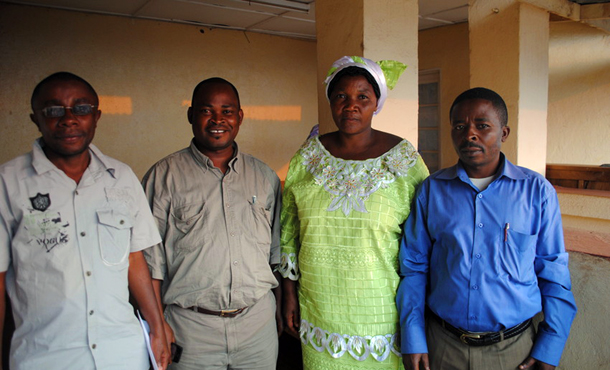In spite of tense relationships between the Democratic Republic of the Congo and neighboring Rwanda, two Mennonite Central Committee (MCC) partner organizations, one on each side of the border, are working together to support the peaceful return of Rwandan refugees to their home country.
[Michael J. Sharp, a 2005 graduate of Eastern Mennonite University, is involved in this delicate and often dangerous work on the Congo side of the border.]

Twenty years ago, in the aftermath of the Rwandan genocide, nearly 2 million people fled into Congo. Most of them were Rwandan civilians, but some were the soldiers and militiamen – known collectively as génocidaires – who had carried out the massacres.
Rwandan soldiers pursued these génocidaires into Congo, causing two wars and countless smaller conflicts and setting the tone for years of frosty relations between the two countries.
Today, more than 100,000 Rwandans still live in eastern Congo. They scrape out a living in the country’s dense forests, where tensions between them and their Congolese neighbors sometimes turn violent.
But two MCC partners – the Program for Peace and Reconciliation (PPR) of the Church of Christ in Congo (an association of Christian churches) and Friends’ Peace House of the Evangelical Friends Church in Rwanda – are working to bring the civilian refugees home in a peaceful way.
“Rwandan refugees in Congo long to return to their homes, even after many years of exile,” said Suzanne Lind, an MCC representative for Congo with her spouse, Tim Lind.
“Military efforts to resolve their status have consistently caused much suffering and death among Congolese civilians and Rwandan refugees alike,” she said. “Through this program, the churches are demonstrating a different way.”
Because Rwandans fled their country in the aftermath of the genocide, many are hesitant to return. Although the Rwandan government and the United Nations provide for their safe repatriation, false rumors persist that those who return will be punished or killed, even if they are civilians.
To encourage Rwandans to consider repatriation, PPR field staff, called animateurs (facilitators), meet face-to-face with refugees, explaining their options for repatriation. Church leaders help the animateurs to make the connections because refugees, although distrustful of Congolese organizations, tend to trust the church leaders in the community where they live.
“It’s dangerous work,” said Sharp, an MCC worker who has served as a consultant to PPR for almost two years. As animateurs travel to meet with refugees, “They’re at the mercy of the armed group who controls that area.”
But despite the danger, the approach works. Over the past seven years, PPR has facilitated the repatriation of more than 19,000 civilian refugees to homes many have not seen for 20 years.
If the refugees decide to return to Rwanda, the animateurs arrange to lead them to designated “rallying points,” where PPR – with support from MCC – provides food and urgent medical aid. From there the Congolese and Rwandan governments facilitate the repatriation, with oversight from the United Nations High Commissioner for Refugees.
Although the returnees are given a small amount of money to help start their new lives, they often struggle to cope in Rwanda.
“After 20 years in the forest, the refugees do not know present-day Rwanda, and many are traumatized,” writes Antoine Samvura, coordinator of Friends’ Peace House. Many bear psychological wounds from their time spent as refugees.
To help them adjust, Friends’ Peace House is launching a project that includes offering psychosocial counseling and humanitarian items, such as school and medical supplies. Staff members have experience counseling Rwandans returning from Europe and will extend those skills to support those returning from Congo. MCC Rwanda has committed to providing supplies and project consultation.
“More Rwandan refugees will return peacefully to Rwanda,” because of this project, Samvura claims. “Repatriates will reintegrate faster into Rwandan communities, which will be stronger and healthier as a result.”
The collaboration between Friends’ Peace House and PPR strengthens the repatriation experience, Samvura added, because refugees are assured that on both sides of the border, “there are organizations that will look out for their security and well-being.”
In Congo, PPR field staff can assure Rwandans they will be taken care of throughout the process – from the time they leave their homes to their first contacts with Friends’ Peace House. Likewise, repatriated refugees in Rwanda can call or write back to individuals who are still in Congo, to reassure them that the process went well.
“Most importantly,” Sharp said, “the process shows that despite the ill will between the two countries, it is still possible for Rwandans and Congolese to work together.”
Courtesy of Mennonite Central Committee, May 20, 2014
